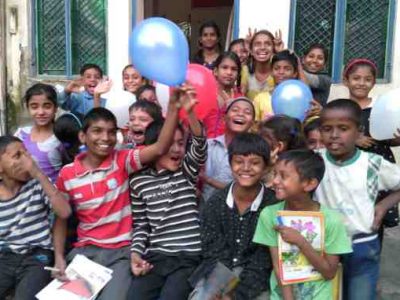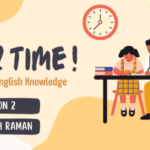
Why Parents Must Treat Kids as their Friends
It is common knowledge that there is always a gap between generations. Teenagers do not like to be told to do or not to do certain things. There are parents who just won’t accept that their kids are now grown up and are in a position to take their own small decisions.
For a parent, kids are always kids, however old they may be. They refuse to accept that the kids may know more about certain things than parents themselves. What is the reason for parents to not to realize that kids need to be treated on an equal level?
The problem is universal. Parents do not let go and they subconsciously suppress kids’ freedom to express. Instead of imposing their will on the kids, parents must give the kids’ expression a chance for exposure.
Anup Attavar elucidates the reasons why parents must treat kids as their friends.
- In this fast paced era, parents do not seem to have quality time for their kids. Due to this, there is a barrier to communication between kids and parents, which could gradually lead to disastrous consequences.
- It is at home that the foundations of values and ethics are created, built and nurtured. The values imbibed by the tiny tots at home are further reinforced at school, by their teachers and the Principal and non- teaching staff.
- It is imperative and the need of the hour that parents must look up to their kids as individuals in their own right, with their own capacity for sentiments and emotions. The onus lies on the parents to win the confidence of kids by treating them as equals.
- Parents are the best well wishers of their children. It is parents who stand by the children when even the closest of friends give up due to paucity of time, their own priorities, their own obligations towards their own family members, etc.
- So it is up to the parents to identify the real needs of children. They can do this with a keen sense of observation, but they should be in direct communication with their kids to be in a position to judge what their kids actually want. By keeping communication lines open with kids, parents will help the kids to realize that someone close to them is listening to them.
- So parents must accept that kids are required to be treated as equals, so that kids feel important in the family. Instead of expecting the kids to come up to the level of the parents, parents themselves must come down to the level of kids, in order to instill confidence in the kids that the elders are with them.
- Kids are innocent. They have their own ideas, fantasies and dreams. Parents on the other hand are conditioned by life, their struggle and the rat race to be one up on their neighbors. Kids have illusions about someone they want to become or something they want to achieve. They are normally not pragmatic in their ideas. It is here that parents must play the role of showing the kids the right path and making them aware of the pitfalls in other paths.
- Once the parents consider their kids as friends, the kids will have no inhibitions in sharing their own joys or sorrows, their small successes or failures with parents. The kids will not have to go elsewhere to seek approval of their actions.
Thus, it is in the interest of kids, parents and society that parents must treat kids as their friends. So, ideally the parent-child relationship has to get transformed into a friendship. Trust has to be created, nurtured and built by parents in their children especially kids in their teens.
Anup Y. Attavar is an expert on issues related to children and young adults. His recent book “World Famous Indian Scientists” is an inspiration and motivation for youth to achieve excellence in their lives and careers.
Parents, teachers, and experts are invited to contribute their opinion articles for the RMN Kids site.














My dear Anup,
I cannot agree with you about your tips on parenting. As the youngest in the family till my younger sister came along and as a veteran parent of two daughters and a son, I think it is a good thing that children remain children for ever for their elders. Of course, parents should not be dismissive or patronizing to their children, whether young or grown up, there is little sense in treating them as friends. Friendship is different and we often expect it to be among equals. Give and take the weaknesses and compensating strengths in each one’s character, friends are equal.
I often looked forward to being treated as a child, be made much of by my elders, parents and elder brothers. They do that, too. My son expects me to treat him as my child, to scold him and harangue him sometimes and amaze him at others with my skill one thing or another (only I have only a few skills). This system, I think works well. I feel comforted by mere presence of an elderly person in my home, not because the elder can protect me or even help me. The elder may even be dependent on me, but their parental presence is extremely comforting.
This comment is against the modern thought, but I know I am right, because I am basing it on my very personal experience and not on what the so-called ‘experts’ say.
I still recall that we used to fear and at the same time, love and respect our teachers when we were kids. Similarly, we would even fear our parents despite all the affection we had for them. This mixture of respect, affection and fear contributed in no small measure in us being obedient children. Even in this age, it is imperative to ‘discipline’ kids at the right time, in the right way. However, things are different nowadays. We like to give excuses that we are caught up in the rat race to give time to our children. As a mother, I feel it is the duty of parents to give all their time to their children. The quantum of time is the same for each and every one. Each of us has only twenty four hours a day. It is how we utilize it and make the most of it that matters. It is necessary to ‘make’ time for our kids. Not doing so is the reason for the gap mentioned in the opening sentence, between parents and children. Proliferation of mobile phones – every member of the family has one – has led to a communication gap between family members. It is a common sight nowadays to see families (even nuclear ones) dining separately, watching TV separately, etc. There used to be a saying in the good old days : “A family that prays together, stays together”. Do people remember this nowadays?
I shall say only after the age of 15 or 16 is the time a parents should start having a ‘friend’ attitude with the kid as thats the time a child gets the understanding of right/wrong and learns to make decisions. Before this age a parents needs to having ‘parent’ attitude which helps the kid to get the right behavior. Fear of parent is important and it is built in to the kid in the early age as without it the kid feels it can get away from mistakes if the parents behaves as a friend. After the age of 16 if the parents has ‘parent’ attitude then the kid tries to do things hiding from parents in fear they will not be able to do them or sometimes just to hurt parents for being strict.
In sanskrit it is said that children at 16 should be treated as friends.For this not only patience but an open mind too is required.Patience to hear them out before jumping to conclusions or making judgements and an open mind to be able to accept their thoughts and ideas.